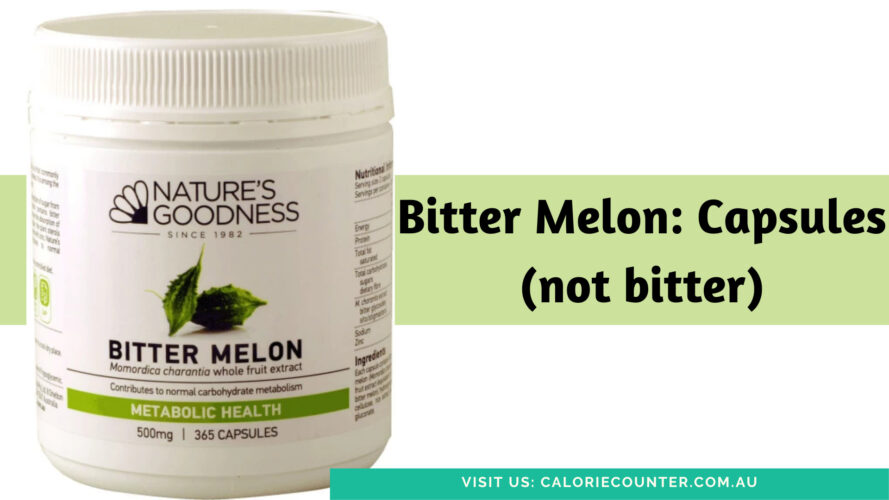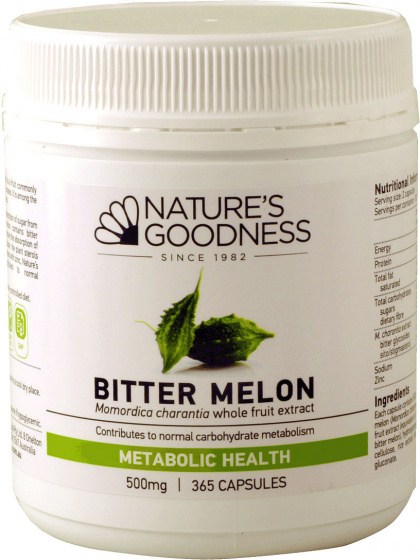Bitter melon can help you to lose weight, according to experts. Is this true, and if so how can it do so and how effective is it? Let’s find out!
Bitter Melon Weight Loss
Also known as bitter gourd (Momordica charantia),or karela, bitter melon is a tropical fruit that is commonly used as a vegetable in cooking. It belongs to the same family as cucumbers, pumpkins, and squash.
Bitter melon has a distinctive bitter taste and is often used in Asian, African, and Caribbean cuisine. It is a good source of nutrients, including vitamins A and C, folate, and potassium.

In addition to its culinary uses, bitter melon is the subject of modern research into its weight loss effects. It has been traditionally used in herbal medicine for its weight loss effects and anti-inflammatory, anti-diabetic, and anti-cancer properties.
Why’s bitter melon so bitter?
The bitterness of bitter melon comes from a group of compounds called cucurbitacins, which are found in various members of the Cucurbitaceae family of plants. These compounds are produced by the plants as a natural defence mechanism against predators, and they have a bitter taste that discourages animals from eating the plant.
Its the Cucurbitacins!
Bitter melon contains several different types of cucurbitacins, including cucurbitacin B, cucurbitacin E, and cucurbitacin I. These compounds are highly bitter and contribute to the characteristic bitter taste of bitter melon.
In many cultures, bitter melon is used in cooking in ways that help to balance out the bitterness, such as by soaking the fruit in salt water or cooking it with other flavourful ingredients.

Studied by Scientists looking for Weight Loss solutions
There have been several peer-reviewed academic studies that have investigated the potential benefits of bitter melon for metabolic health and weight loss. Some of these studies are:
- 2019 systematic review and meta-analysis found bitter melon supplementation was associated with improved glucose control and reduced body weight in people with diabetes.
- 2018 study found bitter melon extract supplementation improved insulin sensitivity and decreased body weight in obese individuals.
- 2017 study found bitter melon juice supplementation reduced body weight and improved insulin sensitivity in overweight individuals.
- 2015 study found bitter melon extract supplementation improved glucose tolerance and decreased body weight in mice fed a high-fat diet.
These studies suggest that bitter melon may have potential benefits for metabolic health and weight loss. It seems that there really is something behind the old-wives tale that people who eat bitter melon don’t get stout!
But How does Bitter Melon help with Weight Loss?
The exact mechanism by which bitter melon supplements might help with weight loss is not yet fully understood. However, there are several potential ways that bitter melon may exert its effects on metabolism and body weight:
- Improved glucose control: Bitter melon may help improve glucose control and insulin sensitivity, which could help prevent or manage diabetes. High blood sugar levels can contribute to weight gain, so better glucose control may help with weight management.
- Reduced calorie intake: Bitter melon may help reduce calorie intake by promoting feelings of fullness and reducing appetite. This could lead to a reduction in overall food intake and weight loss.
- Increased fat burning: Bitter melon may also have a thermogenic effect, which means it can increase the body’s production of heat and energy expenditure, leading to increased fat burning.
- Reduced inflammation: Bitter melon has anti-inflammatory properties, which may help reduce chronic inflammation that is associated with obesity and metabolic disorders.
This sounds wonderful, but couldn’t the same claims be made for many other types of “super-foods”? How is it possible that bitter melon can have these beneficial metabolic effects?

Bitter Melon is packed with Bioactive Compounds
It seems that bitter melon works because it has lots of chemicals in it that mimic those of several of our bodies’ own regulatory signallers. Bitter melon contains several bioactive compounds that are thought to contribute to its potential benefits for metabolic health. These compounds include:
- Charantin: This is a type of steroid found in bitter melon that has been shown to have blood sugar-lowering effects.
- Polypeptide-p: This is a protein that is found in bitter melon and has been shown to have insulin-like effects, which can help improve glucose control.
- Vicine and charantin: These are two compounds found in bitter melon that have been shown to have antioxidant properties, which can help reduce inflammation and oxidative stress in the body.
- Lectin: Bitter melon lectin has been shown to have blood sugar-lowering effects by inhibiting glucose uptake in the intestine.
- Momordicosides: These are triterpenoid saponins found in bitter melon that have been shown to have anti-diabetic and anti-obesity effects.
- Cucurbitane triterpenoids: These compounds have been shown to have anti-inflammatory and anti-obesity effects.
Fat Metabolising Compounds
The bioactive components of bitter melon, specifically cucurbitacin E and charantin, have a similar molecular structure to compounds found in other plants that are known to have fat metabolism promoting properties. For example:
- Cucurbitacin E is a triterpenoid compound that has been found to have anti-obesity effects in animal studies. It is similar in structure to other triterpenoids found in plants like ginseng and licorice, which have also been shown to have weight loss and fat metabolism-promoting effects.
- Charantin is a steroidal saponin that has been shown to have blood sugar-lowering effects. It is similar in structure to other steroidal saponins found in plants like fenugreek, which have also been shown to have anti-obesity effects and improve lipid metabolism.
With this many bioactive compounds, it is no wonder that bitter melon has become the subject of pharmaceutical research! But how did the scientific community become alerted to bitter melon? After all, there are thousands of other bioactive-containing veggies out there!

Used as a Traditional Medicine for Ages
Scientists took an interest in bitter melon because it has been used in traditional medicine for centuries, particularly in Asia and Africa, for its purported health benefits, including its effects on metabolic health. This traditional use of bitter melon caught the attention of researchers in the field of metabolic health, who were interested in exploring the potential mechanisms behind its supposed effects.
The first studies on the effects of bitter melon on metabolic health were conducted in the 1980s and 1990s. These early studies, conducted in animal models and in vitro, suggested that bitter melon had blood sugar-lowering effects and could improve glucose control.
More research is ongoing to fully understand the mechanisms behind bitter melon’s effects on metabolic health, its traditional use and early research findings have led to a growing interest in bitter melon as a potential natural remedy for metabolic conditions such as diabetes and obesity.
Traditional bitter melon medicine takes several forms, including:
- Tea: Bitter melon tea is made by steeping fresh or dried bitter melon slices in hot water. It is a popular home remedy for a variety of ailments.
- Juice: Bitter melon juice is made by blending fresh bitter melon with water or other fruits and vegetables. It is a popular beverage in many parts of the world and is believed to have medicinal properties.
- Extracts: Bitter melon extracts are made by concentrating the active compounds in bitter melon using a variety of methods, including drying, boiling, or fermenting. These extracts are often used in supplements and other herbal preparations.
In traditional medicine, bitter melon is used to treat a variety of ailments, including:
- Diabetes: Bitter melon has long been used in traditional medicine to treat diabetes and is believed to have blood sugar-lowering properties.
- Digestive issues: Bitter melon is also used to treat a variety of digestive issues, including constipation, diarrhea, and indigestion.
- Skin conditions: Bitter melon is believed to have antibacterial and antiviral properties and is used in traditional medicine to treat skin conditions such as eczema, psoriasis, and acne.
- Respiratory conditions: Bitter melon is also used to treat respiratory conditions such as asthma, bronchitis, and coughs.
- Immune system support: Bitter melon is believed to have immune-boosting properties and is used in traditional medicine to support overall health and wellness.

Eaten by Humans for Thousands of Years
Bitter melon has a long history of culinary use in various cuisines throughout Asia, Africa, and the Caribbean. It is commonly used in traditional dishes in India, China, Thailand, and Vietnam, among other countries.
- Indian cuisine: bitter melon is often used in curries, stir-fries, and chutneys. It is also a popular ingredient in traditional Ayurvedic medicine, where it is believed to have a variety of health benefits.
- Chinese cuisine: bitter melon is used in soups, stir-fries, and steamed dishes. It is also commonly used in traditional Chinese medicine for its supposed health benefits.
- Thai cuisine: bitter melon is used in stir-fries, curries, and salads. It is often paired with spicy and sour flavours to balance out its bitterness.
- African cuisine: bitter melon is used in stews and soups. It is also commonly used in traditional medicine for its supposed health benefits.
- The Caribbean: bitter melon is used in various dishes, including stews, soups, and rice dishes. It is also used in traditional medicine for its supposed health benefits.
Despite bitter melon’s bitterness, it is valued in many cultures for its unique flavour and potential health benefits. In addition to its use in traditional cuisines, bitter melon is also used in various forms of alternative medicine, including Ayurveda, traditional Chinese medicine, and traditional African medicine.
What do People who try it say?
Many people who have tried bitter melon for its health benefits have reported positive effects on their metabolic health, including:
- Improved blood sugar control: Some individuals with diabetes have reported improvements in their blood sugar control after taking bitter melon supplements.
- Weight loss: While research on bitter melon’s effects on weight loss is limited, some people have reported weight loss after taking bitter melon supplements.
- Improved cholesterol levels: Some individuals have reported improvements in their cholesterol levels after taking bitter melon supplements.
- Reduced inflammation: Bitter melon contains compounds that may have anti-inflammatory properties, and some people have reported reduced inflammation after taking bitter melon supplements.
After a few weeks of eating bitter melon, most people get used to the bitter taste and start preparing it in new and interesting ways. Some people make an infusion or tea from it, whilst others blend it to add to their favourite smoothie.
How to get Bitter Melon in your Diet
In fact, Bitter melon can be incorporated into everyday meals in a variety of ways, depending on personal taste and culinary preferences. Here are some suggestions for incorporating bitter melon into your diet:
- Stir-fry: Bitter melon is commonly used in stir-fry dishes in many Asian cuisines. Cut the bitter melon into thin slices and stir-fry with other vegetables and protein sources for a flavourful and nutritious meal.
- Curry: Bitter melon can also be used in curries. Cook the bitter melon in a spicy and flavourful sauce with other ingredients like vegetables, meat, or tofu.
- Salad: Thinly slice bitter melon and mix it with other vegetables in a salad. Pair it with a tangy dressing to balance out its bitterness.
- Juice or smoothie: Bitter melon can be juiced or blended into a smoothie with other fruits and vegetables for a nutrient-packed drink.
- Capsule or supplement: If bitter melon is not readily available in your area or you do not enjoy its flavour, bitter melon capsules or supplements can be taken as a daily supplement to obtain the beneficial components.
It is important to note that bitter melon can have a strong and bitter taste, which can be an acquired taste for some individuals. Additionally, bitter melon may not be appropriate for everyone, particularly those with certain medical conditions or those taking certain medications. Pregnant women especially should not eat bitter melon or take bitter melon supplements.

Risks of eating Bitter Melon
While bitter melon is generally considered safe to eat, there are some potential risks associated with consuming it. Remember that its not your average everyday vegetable, it is packed with bioactive compounds. Here’s what to know before you start eating it:
- Hypoglycaemia: Bitter melon has blood sugar-lowering effects and may interact with certain medications used to treat diabetes. Individuals with diabetes should talk to their healthcare provider before consuming bitter melon to avoid the risk of hypoglycaemia (low blood sugar).
- Gastrointestinal distress: Bitter melon may cause gastrointestinal distress, including abdominal pain, diarrhea, and vomiting, especially when consumed in large amounts.
- Allergic reaction: Rarely, some individuals may be allergic to bitter melon and experience symptoms such as itching, hives, and difficulty breathing.
- Pregnancy and breastfeeding: Bitter melon may have abortifacient effects, which means it may cause spontaneous abortion or premature labour. Pregnant or breastfeeding women should avoid bitter melon to avoid any potential risks.
- Interaction with medications: Bitter melon may interact with certain medications, including blood thinners, which may increase the risk of bleeding. Individuals taking medications should speak with their healthcare provider before consuming bitter melon to avoid any potential interactions.
It is important to note that these risks may vary depending on the individual and their specific health conditions and medications. As always, it is recommended to speak with a healthcare provider before incorporating bitter melon into your diet or taking bitter melon supplements.
Where to Get Bitter Melon
You can buy fresh and preserved bitter melon from some greengrocers and general grocery stores. It is quite rare to find bitter melon in the big supermarkets in Australia, because its bitterness makes it a poor seller. Your best bet is to visit your local small produce vendor who specialises in Asian ingredients. You can’t mistake it when you see it: it looks like a warty cucumber with sharp ends.
Alternatively, you can take a bitter melon supplement in tablet or capsule form. It is probably the most reliable way to get a standard daily dose without having to withstand the bitterness!











